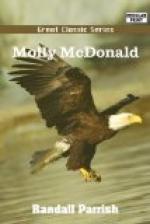It was after nine o’clock when the sentries challenged the advance of Custer’s column, as it stole silently out of the gloom. Ten minutes later the men were hovering about the fires, absorbing such small comforts as were possible, while the General and Major Elliott discussed the situation and planned to push forward. An hour later the fires were extinguished, the horses quietly saddled, and noiselessly the tired cavalrymen moved out once more and took up the trail. The moon had risen, lighting up the desert, and the Osage guides, together with the two scouts, led the way. At Custer’s request Hamlin rode beside him in lead of the troopers. Not a word was spoken above a whisper, and strict orders were passed down the line prohibiting the lighting of a match or the smoking of a pipe. Canteens were muffled and swords thrust securely under saddle flaps. Like a body of spectres they moved silently across the snow in the moonlight, cavalry capes drawn over their heads, the only sound the crunching of horses’ hoofs breaking through the crust.
The trail was as distinct as a road, and the guides pushed ahead as rapidly as by daylight, yet with ever increasing caution. Suddenly one of the Osages signalled for a halt, averring that he smelled fire. The scouts dismounted and crept forward, discovering a small campfire, deserted but still smouldering, in a strip of timber. Careful examination made it certain that this fire must have been kindled by Indian boys, herding ponies during the day, and probably meant that the village was very close at hand. The Osage guides and the two white scouts again picked up the trail, the cavalry advancing slowly some distance behind. Custer, accompanied by Hamlin, rode a yard to the rear and joined the scouts, who were cautiously feeling their way up a slight declivity.
The Osage in advance crept through the snow to the crest of the ridge and looked carefully down into the valley below. Instantly his hand went up in a gesture of caution and he hurriedly made his cautious way back to where Custer sat his horse waiting.
“What is it? What did you see?”
“Heap Injuns down there!”
The General swung down from his saddle, motioned the Sergeant to follow, and the two men crept to the crest and looked over. The dim moonlight was confusing, while the shadow of timber rendered everything indistinct. Yet they were able to make out a herd of ponies, distinguished the distant bark of a dog and the tinkle of a bell. Without question this was the Indians’ winter camp, and they had reached it undiscovered. Custer glanced at his watch—the hour was past midnight. He pressed Hamlin’s sleeve, his lips close to the Sergeant’s ear.
“Creep back, and bring my officers up here,” he whispered. “Have them take off their sabres.”




